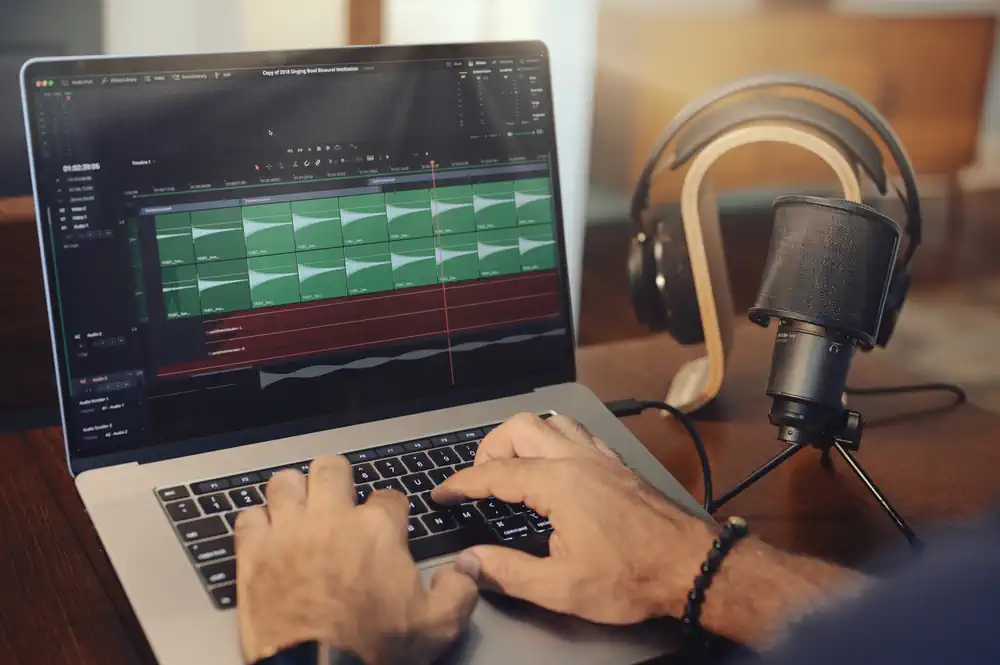Podcasting has become an essential medium for content creators, businesses, and thought leaders to share their message and connect with audiences. However, producing a high-quality podcast requires technical expertise that many creators don’t have time to develop. This is where podcast editing and production services come in – providing the professional polish and technical know-how that turns raw recordings into engaging, professional content that helps podcasters build their audience and achieve their goals.
The Value of Podcast Editing Services
By offering podcast editing and production services, you help content creators, businesses, and individuals produce high-quality audio content that engages their audience and enhances their brand.
Many podcasters struggle with the technical aspects of editing and producing professional-sounding episodes, which can affect their ability to grow their audience. Your expertise allows them to focus on content creation, while you handle the technical work of ensuring each episode is polished, free of distractions, and optimized for the best listener experience. By delivering professionally edited episodes, you help podcasters build credibility, attract more listeners, and grow their platform.
Understanding Client Goals and Vision
Your process begins by understanding the goals of the podcast. Every show has a unique format, audience, and tone. Whether the podcast is an interview-style show, storytelling series, or a branded business podcast, knowing the overall vision helps guide your editing choices.
You’ll work with the client to understand the style they want, whether it’s a clean, straightforward edit or a more creative production with sound effects, music, and transitions. This ensures that your editing aligns with the podcast’s branding and enhances the listener’s experience.
Core Editing Services
The foundation of podcast editing involves several key technical processes that transform raw recordings into polished, professional content.
Audio Cleanup and Enhancement
Raw audio files often need significant cleaning up. Your first step in the editing process is removing any unwanted noises, background sounds, or technical glitches. This might include eliminating static, background hum, or other distractions that could affect the clarity of the audio.
You’ll also cut out any awkward pauses, mistakes, or filler words like “uh,” “um,” or excessive repetition. Cleaning up the raw audio is essential for creating a smooth, professional-sounding episode that keeps listeners engaged from start to finish.
Audio Level Balancing
Balancing audio levels is another critical component of podcast editing. You’ll ensure that the host and guest voices are balanced, so one person isn’t louder than the other. Listeners should be able to hear each speaker clearly without having to adjust their volume throughout the episode.
You’ll also make sure that any added music, intros, or ads are properly balanced with the voices to maintain a cohesive sound. Achieving the right balance creates a polished listening experience and keeps listeners focused on the content rather than on any technical issues.
Music and Transition Integration
If the podcast includes intro music, transitions, or ads, you’ll seamlessly integrate these elements into the episode. This includes setting up smooth fades between segments, ensuring that music or sound effects don’t overpower the dialogue, and timing everything correctly.
The goal is to create a cohesive flow between sections of the podcast so that the episode sounds well-structured and professional. For clients who don’t yet have intros or outros, you can help create branded elements that add a signature sound to the podcast, helping to build its identity.
Advanced Production Techniques
Beyond basic editing, advanced production techniques elevate a podcast’s quality and help create a more engaging listening experience.
Multi-Track Editing
For podcasts that rely heavily on interviews, you’ll also manage multi-track editing, especially when interviews are recorded remotely. Often, remote recordings have inconsistencies in audio quality, such as one person’s audio being clearer than the other’s or varying levels of background noise.
You’ll clean up each track individually to ensure consistency across the episode, adjusting levels, syncing the audio, and removing any technical glitches or delays. This creates a unified, high-quality audio experience, even when interviews are conducted remotely.
Storytelling and Pacing
Storytelling and pacing play a significant role in the editing process. Depending on the podcast’s style, you may need to adjust the pacing of the conversation to keep it engaging.
This might involve tightening up slow sections, rearranging parts of the conversation for better flow, or adding in sound effects or music to heighten the mood. For podcasts that rely on storytelling, such as true crime or narrative-driven shows, you’ll help build suspense and maintain listener interest by carefully crafting how the story unfolds. Good pacing keeps the audience engaged and makes the episode more compelling.
Technical Optimization and Distribution
Once the editing is complete, you’ll export the episode in the correct format for distribution. Most podcasts require files in MP3 format, but different platforms may have specific requirements for file size, quality, or metadata.
You’ll ensure the episode is optimized for podcast directories like Apple Podcasts, Spotify, or Google Podcasts, including adding metadata such as episode titles, descriptions, and show notes. Proper file formatting ensures that the episode sounds great no matter where listeners are tuning in.

Additional Services
Beyond core editing and production, there are several supplementary services that can enhance the overall podcast experience and client relationship.
Show Notes and Episode Descriptions
Show notes and descriptions are often an overlooked part of podcast production, but they’re essential for helping listeners find and engage with the content. You can offer show notes writing as an additional service, providing a brief summary of the episode, timestamps for key topics, and links to any resources mentioned during the show.
Well-written show notes not only improve SEO for the podcast but also give listeners a quick overview of the episode, making it easier for them to decide whether to listen. This helps attract more listeners and improves the discoverability of the podcast.
Client Communication and Revisions
Once the episode is live, ongoing feedback and revisions are an important part of maintaining a strong relationship with your clients. You’ll provide a set number of revisions as part of your service, allowing the client to make adjustments if needed.
Regular communication with the client ensures that their expectations are met, and any changes they want in future episodes can be easily incorporated. This flexibility helps you deliver a final product that aligns with the client’s vision and keeps them satisfied with your services.
Business Aspects
Successfully running a podcast editing service requires attention to both the technical and business sides of the operation.
Pricing Strategy
Pricing your podcast editing services can vary based on the length of the episode, the complexity of the edits, and the additional services provided. Simple edits, such as removing filler words and balancing audio levels, may be priced lower, while more complex projects that include multi-track editing, sound effects, and music integration will command higher fees.
Offering tiered pricing based on the level of editing and production allows you to cater to different types of clients, from casual podcasters to businesses running branded shows. You can also offer ongoing editing packages for clients who need regular episode production, providing a steady stream of income.
Marketing and Client Acquisition
Marketing your podcast editing services effectively is key to building a client base. You’ll need to showcase examples of podcasts you’ve edited, highlighting the improvements in audio quality and the overall listening experience.
Sharing testimonials from clients who have seen success with your editing services adds credibility and reassures potential clients that you deliver professional results. Networking with podcasters, content creators, and businesses looking to start their own podcast can help you find new clients. As you build a reputation for delivering high-quality, polished episodes, referrals and word-of-mouth will help grow your business.
Is Podcast Editing Right For You?
A career in podcast editing could be an excellent fit if you align with these qualities and interests:
- You have a good ear for sound quality and can quickly identify audio issues that need fixing
- You enjoy working with technology and aren’t afraid to learn new audio editing software and techniques
- You’re detail-oriented and patient enough to make precise adjustments to achieve the perfect sound
- You appreciate storytelling and can recognize how pacing and structure affect listener engagement
- You’re comfortable working independently for long periods while maintaining focus
- You have good time management skills and can handle deadline-driven work
- You enjoy learning about different topics, as you’ll be editing content across various subjects
- You’re able to maintain consistent quality while working on repetitive tasks
- You have good communication skills for understanding client needs and providing updates
Getting Started as a Podcast Editor
Beginning your journey as a podcast editor requires some essential preparation and skill development:
- Master a professional Digital Audio Workstation (DAW) like Adobe Audition, Logic Pro, or Reaper – choose one and learn it thoroughly through online tutorials and practice
- Build a sample portfolio by offering to edit episodes for friends or creating before-and-after examples using freely available podcast content
- Develop a standard workflow that you can apply consistently across different projects, including file organization, backup procedures, and quality control checks
- Create a basic toolkit of resources, including sound effects libraries, royalty-free music sources, and audio plugins for noise reduction and enhancement
- Join online communities of podcast editors and producers to learn industry standards and best practices
- Document your editing process and create service packages that you can easily explain to potential clients
- Start small with one or two clients to refine your workflow before taking on more work
- Consider specializing in a specific podcast genre or format to differentiate yourself in the market
Growing Your Podcast Production Business
Offering podcast editing and production services is a highly valuable freelance opportunity. You help podcasters focus on content creation while ensuring their episodes are polished, professional, and engaging for their audience.
By managing everything from audio cleanup to episode formatting, you provide a critical service that improves the overall quality of the podcast, helping clients grow their listener base and build their brand.
With podcasting continuing to rise in popularity, your skills are in demand, making it a profitable and flexible freelance business that allows you to support a wide range of clients.




